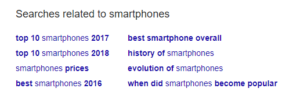Complete Guide to Select Best SEO Keywords for Your Blog and PPC ad Campaign

Did you ever count how many times a day you look for something in Google? 4 times in 5 you will search for a solution in Google, if not Google then Yahoo, Bing etc. Search engines makes our life easy in online surfing. It gives us the ability to sort through the limitless amount of information available online and gives the exact result we’re looking for. When it comes for our websites to be seen in people’s searches, we need to put something essential on it, so people can find our websites easily. And those “something” are called Keywords. These Keywords are also known as SEO keywords.
Keywords generally strung together with one to five words. Keywords highlight a topic interest to a search engine. To generate higher revenue from your website or blog, finding right keywords for search engine optimization or PPC ad campaigns are extremely important. Let’s find out why keywords are important and how you can find worth SEO friendly keywords for your blog.
Why Do We Need Keywords?
To ensure that our blog post or PPC campaign are successful we need keywords. Below are the main reasons we need to think for good keywords.
What Is The Page About?
When users are typing something on search engines, it’s always trying provide them with the most valuable information. For this reason when search engines crawl through our website it checks to see what keywords are used on most of our website pages. By crawling, search engines get the idea about our website or blog pages and then it shows those pages to users who are looking for it.
What is The Content About?
Topics or contents on a web page or blog post should be based on keywords that are friendly for search engines. Because your topics keywords represent your whole content or post. These keywords allows to have appropriate topics to write about and ties all contents on a post together. Try to place keywords on topics naturally.
What Are The Users Looking For?
It happens often, users first go through the heading, subheading and few points on your blog post. They don’t even bother to read the whole post. When they find the points (main focused keywords), they immediately know that they have landed on the right place and will find the exact information they are looking for. Then they start reading your whole post. This is one of the reasons you need to think about the right keywords for your blog posts.
If You Want, Read More About Is Namecheap Best to Host Your Blog or Website? : A-Z unbiased, In-depth Review.
How Keywords Help For PPC Search Campaigns?
If PPC campaigns have the right keywords on it, ads will defiantly show up in relevant searches. If you want your ads to show up in the exact right places then finding relevant keywords are more than essential to get the success of your ad campaign. So let’s see how you can find the best keywords that work for SEO and PPC.
Think About Your Audience and Goals
First thing you need to do is finding the right keywords that define both who your audiences are and what your goal is. Let’s see some steps on how you can do this.
Audiences
It depends on what kind of people you want to come visit your website. It can depend on a product or services you are selling to people. Or it can be that your niche idea is based on a certain location for a specific group of people. When you are targeting a specific group of people, you also need to select the specific keywords for those people. For example, if your audiences are from USA only, you need to make sure your keywords include USA English spelling. This will also help you to find out the type of speech that appeals that group of people. This will give you more freedom to narrow down your keywords.
Conversions
While defining keywords keep in mind your goals also. When doing PPC ad campaign think about the lead page that you are promoting on search engines. What type of action you want your users to take? What type of marketing ad campaign is going to target with the campaign? What type of results are you expecting from the ad campaign? This is also same true for the on page SEO. What is the goal of your page or post? How you want users to convert? Finding your goals will help you to define specific keywords that are appropriate for conversion.
Find Out the Primary Keywords
You need to keep in mind some important things while going to build a list of appropriate keywords for your pages, posts and PPC campaigns. Keywords that are profitable, generally includes one or two main words that define the purpose of the post or page and join additional words to support primary keywords. Let me tell you how you can find the appropriate keywords.
Appropriate Keywords That Describe Your Products or Services
You need to look to your conversion goals. To get visitors to purchase your product or service, a good place to start would be words that describes that product or service. Let’s say, you’re trying to sell camping tents or you are referring to an affiliate product, then “camping tents” would be a great primary keyword. This can also apply to SEO within your blog post. The main topic of the post can be travelling, hiking, camp, camping, vegan food, Smartphones etc.
Your Brand’s Keywords
I guess you’re brand is somehow already recognized across the internet. If you use your own brand keywords to draw people’s attention in to your business that will be a great SEO help. Using your own brand’s keywords is both healthy for your SEO and PPC, because it ensures that people who are specially searching with your brand name can find you easily. Drawing people’s attention in this way to your site is an excellent way to increase ROI. Searchers are looking for your brand which means they’re at the very bottom of marketing funnel. They will more likely to purchase your product if they are searching by your brand name and find you successfully. Remember this only helps if your brand is already somewhat recognized.
Locating Keywords
Let’s say your business is in physical location, then I highly recommend to use location-based keywords. You should be including your country, region and other relevant stuffs. If you like you can narrow down these keywords to more specific such as your state, city, or even neighborhood if that is appropriate.
If you do this, it will be easier for search engines and people to find the area of your business. This will also help you to weeding out your competition that is not already in the search result. This will make sure you get to the top. You can still target a certain areas even if you don’t have a physical location of your business.
How to Research Primary and Secondary Keywords Using Free Tools?
Now that we have discussed about some ideas for primary keywords for your topic, let’s see how we can find them by using some great free tools. We need to make sure that the list we made with keywords are actually profitable. Here are few major free tools that we can use to make sure our selected keywords are profitable.
Keywords Everywhere
This plugin directly works with Google searches. It is a browser plugin that allows to see the monthly search volume of any Google search that you done. We’ve used recently this plugin and found an amazing result. This plugin is helpful for research topics to find out primary keywords. It helps you to see how many searches are appearing on a regular basis with keywords that you are interested in using. You’ll be able to see which websites are currently ranking well for the keywords that you’ve searched for. It will also show the search volume for those keywords.
Google Trends
Almost everyone knows about Google trends now a days. This is the most popular one to find out the exact keywords that people are going crazy about. I regularly use this tool to find out profitable keywords. And the result is amazing. The main purpose of this tool is to check popularity over time of any given keyword. With the help of this tool you will be able to see people’s daily interest, seasonal interest or whether the keyword is increasing its search volume or decreasing over a long period of time. You can target these results to specific countries or even a small area.
You’ll have the full advantage of seeing the rising popularity of any keywords which will help to boost up your website contents or posts! Google trends tool allows you to compare the popularity of different primary and secondary keywords. Google Treads graphics and charts are very easy to understand which allows you to see which of your keywords are more valuable and profitable to use on your website. If your website traffic are based on a specific country, you’ll see any topics popularity on that country. It also shows a chart of relevant keywords that popularity is rising. In general Google Trends gives you an awesome overview of you general interest in best keywords that you are looking for and gives you the option to choose your profitable and valuable keywords.
Keyword Planner
Keyword Planner is also an awesome tool that Google provides with Google’s AdWords program. This tool is useful when you’re looking for PPC keywords or even SEO keywords. To use this tool you need to open an account with AdWords but don’t need to pay anything because this tool is free. Google’s keyword planner allows you to type in the product or service that you are going to sell, landing page URL and some other keywords fitters for targeting parameters. Find a competing website and use that URL if you don’t have a landing page setup. When you’re done, then the tool will show you a great list of keywords related to the topic you have placed.
This is the great starting point to select the primary and secondary keywords and you can see the search volume as well. It shows the mid-range search volume keywords. If the search is high then that is good because it means the competition is very good. On contrary if the search volume is low that will not bring you a good ROI. This is the reason it is good to go for the keywords that has mid-range search volume.
What are The Long-Tail Keywords?
I guess you have found your primary keywords. Now it’s time to put them on log-tail keywords. Few board terms on your list of potential keywords. I’ve talked about vegan food, smartphones, etc. We have already narrowed these slightly to your industry level but they are still quite board. What long-tail keywords do, they take those board keywords, primary keywords and narrow down them even more. It feels like you want those keywords to point directly towards you or your website, blog!
These keywords are created by placing additional words in your selected keywords, up to four or five. Like, instead if using “smartphone” we use “smartphone for smart people”. Longer keywords are great for SEO, because they draw more attention of people and bring more traffic to our website. People who search for this terms are looking for something which is more specific. If the website is ranking well then they will turn to your website to find their questions answers. These specific users are more likely to closer to the marketing funnels which is great news for you. This is how these users turn to more new leads. Long-tail keywords are easier to rank on search engines. You will see search volume is lower and the competition is also the same for these keywords. This means that you have great chance to rank high on search engines like Google.
Where and How to find Log-Tail Keywords?
Now that you know why we need long-tail keywords, let’s find out how to find them. I’ve given some more tools to find out primary long-tail keywords.
Google!

Google itself is the gigantic tool that you can use to find long-tail keywords. Several ways are there in Google to search and find keywords that are more specific to your business. When you have searched something on the Google you will see on the bottom there is a related search box with keywords. This box is the perfect example of long-tail keywords. For example, if you search with the word “smartphones” that we talked above, you’ll see bellow result.
ADD PHOTO
Using this suggestion idea of long-tail keywords is the best practice. If you use the keyword planner you’ll be able to see the search volume beside those long-tail keywords. This will give you the complete idea on which one to use for your post or website pages.
What is LSI Keywords and Synonyms?
LSI or Latent Semantic Indexing is important while collecting relevant keywords. It is best for both SEO and PPC to complete the essential package. In easy words, these are the keywords that use synonymous or related words to the one you’re already using. For example, smartphones LSI wards would be secondhand smartphones, used phones etc. When you are doing keyword research using synonyms to find LSI keywords are very important. Because you may find that LSI keyword has better search volume than your main primary keywords. If you don’t find LSI keywords that are more valuable, try to keep a list of these related keywords for the future use.
How to Use the Keywords?
By now you probably have a long list ready to use. Let’s see how can you use those keywords and take the most advantage of them? We are going to discuss the uses of both SEO and PPC and see how to get most out of those keywords.
On Page SEO Usages for Checking the Competition
It’s good to check the competition before starting to get them rank individually.You should be doing this before starting new blog post as we do for our post as well. Your post or pages have to better than the competition if you want to rank well in all search engines. Find out what websites come first when you are searching for long-tail keywords. This will help you to get the idea about your competitors. Also see what kind of post you find and what information are there on those post. For example, let’s say we are trying to find out long-tail keywords about smartphones and its substitutes.
When I search my long-tail keyword, I’ll always skim through the first few results to check out the competition. If those articles well put together or not? If they answered all the questions that people are looking for or not? If the informations are enough or not? If there is any grammatical or spelling errors or not? You have to remember that SEO is not just about keywords. It takes into account the value that content provides. If the competitor’s contents are lacking of value and correct information, than you can make your page or post better than them.
Placing the correct Stuffs
This point is much more important as we all know. This is why we need to give more emphasize on it. If you put the keywords that really don’t need on your post that is pretty bad for good SEO. You may be able to trick the search engines bots for a while but by time they will find out if your contents are actually valuable to readers or not. And the result will be worst for your contents. Try to balance the keywords with actual content value. This is the main key to maintain a good SEO strategy. It’s good practice to find the place where the keywords fit naturally.
Placing the contextual keywords
We talked about a list of LSI keywords above, this is where it becomes more useful. There are certain things a search engines bots want to see when they are crawling your website pages or blog posts. They start with your main keywords which leads to the correct understanding of what your content is about. When they find these keywords, they also want to see contextual and LSI keywords within your web pages or blog posts. When they find those contextual keywords within your post or pages, they know that your post have the value to be presented on people search results. This is how contextual keywords help your post to grow more on search results and brings more visitors for your site or blog posts.
Placing Keywords in Media Alt Tags, Metadata and Headings
Well, these are another places where you should be placing your keywords. These three areas are very important for SEO. When search engines bots finds the right and appropriate keywords on your heading, metadata and media alt tags, they know what is your content about. By this your post gets huge boots on search rankings. Headings need to be capture the essence of your post. Most of the time heading is the only thing that readers really read first and decides whether to read the whole post or not. So it’s important to make sure your heading tells the short story of your post or a specific topic. Placing appropriate keywords on the title or in your Meta descriptions is another place to impress the bots and the readers. Media alt tags should tell about what the media is about. Like the photo short description that we use on our WordPress websites media file.
Mid-tail Keywords on PPC usages
Length of mid-tail keywords are between 2-4 words. Mid-tail keywords are most effective in PPC ad campaign. Researches show that 94% of impressions will come from search terms that include keywords no more than 4 words. Mid-tail keywords increases the impressions and improves the conversion. Try to keep these keywords with 2-4 words and get the most use of it.
Do not use Negative Keywords!
When you are going to do PPC ad campaign, you will have the option to use negative keywords. These are nothing but some similar to your keywords. These keywords do not match really your contents or products keywords. Avoiding these is a better decision. When you are running ad campaign, be careful to choose terms that bringing up your site to Google ads.
Final Thoughts
When bringing visitors or getting ranked on search engines, choose your keywords carefully and smartly. Finding the appropriate keywords for your SEO and PPC campaign is an easy way if you know where to start from. The tips that I’ve talked about on this post will help you to get most visitors if your follow them correctly. I hope this post will help you to find the worthy keywords for your SEO and PPC Ad Campaign. Best of luck.



